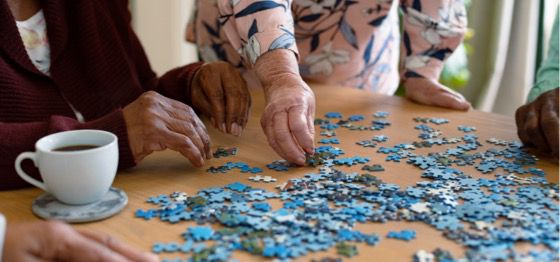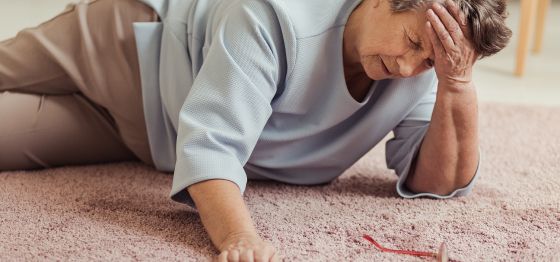Aging affects the brain in a variety of ways, with both positive and less-than-positive impacts. Older adults may notice difficulty finding words, recalling names, multitasking and paying attention. However, seniors also benefit from a lifetime of accumulated experiences and have more extensive vocabularies and general breadth of knowledge compared to younger adults.1
Perhaps most importantly, research shows that seniors can still learn new skills, form new memories, and improve existing vocabulary and language skills. In fact, if given enough time to learn a new task, older adults usually perform just as well as younger people on complex memory or learning tests. Evidence shows that the brain maintains the ability to change and adapt even as it ages.2
Brain health for seniors
As we age, changes occur in the brain which can affect mental function. These changes include:3
- Areas important to learning and complex mental activities shrink.
- Communication between nerve cells may be less effective in certain brain areas.
- Blood flow to the brain may decrease.
- Inflammation may increase.
In general, many of the actions promoting brain health are familiar and part of a routine designed to keep the body healthy as well. Here are suggestions for brain boosters for seniors:4
Exercise regularly. Physical activity has brain benefits, which are believed to result from increased blood flow to the brain during exercise. Studies show that people who are physically active are less likely to experience cognitive decline and have a lower risk of developing Alzheimer’s disease. Exercise tends to counter some of the natural reduction in brain connections that are a part of aging, effectively reversing some problems. 5
Get enough sleep. Some scientists theorize that sleep helps clear abnormal proteins in the brain and consolidate memories.6
Eat a healthy diet. Researchers have found that omega fatty acids such as those found in healthy fats like extra-virgin olive oil may increase mental focus and slow cognitive decline.7
Stay socially connected. Social interaction may protect against depression and stress, both of which contribute to memory loss.8
In addition, it’s important to stay mentally active. It’s been said that one should treat the brain like a muscle: Use it or lose it.9
Improving memory for seniors
Decline in certain types of memory—primarily episodic and long-term memory—is a normal part of aging. Ways to work with and support the aging brain when it comes to memory issues include:10
- Keep “to do” lists and post them where they will be seen often. Mark off accomplished items.
- Maintain a routine. Doing things at the same time of day, each day — like taking medication — aids memory.
- Slow down. Allow time to learn new information or recall old information.
- Be organized. Keep things in the same place and return things to their place after use.
- Keep a calendar. Whether on paper or electronic, keep a calendar up to date and consult it regularly.
Brain health games for seniors
Most research does not yet support the claims of so-called “brain games.” Brain games claim to improve memory, attention, logic or speed of processing in general, although playing games will improve the skills necessary to play that specific game. Studies show that there may be some positive effect of brain training games in protecting against cognitive decline,11 but those effects don’t necessarily come from expensive electronic applications marketed for brain training. Reports in the International Journal of Geriatric Psychiatry show that seniors who do a crossword puzzle or play Sudoku daily have the problem-solving skills and short-term memory of someone 8 years their junior12
Supplements as brain boosters for seniors
The American Association for Retired Persons’ Brain Health and Dietary Supplements Survey, released in 2019, shows more than 25% of Americans aged 50-73 take brain health supplements regularly. The percentage rises to 36% for those 74 and older.13
The most popular supplements for memory enhancement, according to the survey, are omega-3, turmeric/curcumin and green tea.14
While more than 75% of those surveyed said they believed the supplements are effective, there’s no scientific evidence to support that. Seniors who take supplements may also be more conscious of their health in general and beneficial effects attributed to supplements may in fact be coming from healthy diet and exercise.15
Some things to consider when shopping for supplements include:16
- Look for a seal of approval from U.S Pharmacopeia, ConsumerLab.com or NSF International, independent organizations that test supplements for proper manufacture, truthful labeling and freedom from harmful contaminants.
- Check for interactions between supplements and medications/drugs. Consult a doctor or pharmacist.
- Be wary of health claims. Dietary supplements are prevented by law from claiming to treat, cure or prevent specific diseases.
- Take them correctly. Research to determine if a particular supplement is fat soluble and should be taken with food, for example.
- Avoid gummies. The manufacturing and stabilization processes involved in producing them often means they will include extra and unnecessary ingredients.
In older adults the brain may be changing, but that doesn’t mean it is declining. The myth that aging itself is predictive of cognitive decline can be a self-fulfilling prophecy. Studies have shown that older learners do worse on memory tests when they’re exposed to negative stereotypes about aging and memory. The same learners do better on those tests when they receive positive messages about memory preservation into old age. Stay mentally active: Read, play chess, do crossword puzzles, take classes, play an instrument. Keeping the brain busy and believing in its ability to learn and remember, even while aging, may be the key to keeping the brain young.16
Go365 by Humana® makes wellness fun and easy. We help Humana Medicare members with Go365® on their plan reach health goals as well as take care of their physical and emotional health—allowing members to thrive at any age.
Humana Medicare members with Go365 on their plan can enroll in Go365 at
Go365 is a well-being and rewards program for many Humana Medicare Advantage members. Rewards have no cash value and can only be redeemed in the Go365 Mall. Rewards must be earned and redeemed within the same plan year. Any rewards not redeemed by December 31st will be forfeited.
To learn more about Humana Medicare Advantage, call to speak with a licensed Humana sales agent at 1-844-321-5843 (TTY:711), Monday – Friday, 8 a.m. – 8 p.m. local time or visit
If you need to enroll in Medicare Advantage or change your plan outside of the usual Medicare enrollment periods, a Special Election Period (SEP) could be the answer. For information on eligibility, visit Humana’s
Sources:
1“How the Aging Brain Affects Thinking,” National Institute on Aging, last accessed October 18, 2022.
2“How the Aging Brain Affects Thinking.”
3“How the Aging Brain Affects Thinking.”
4Donn Dexter, “5 tips to keep your brain healthy,” Mayo Clinic, last accessed October 18, 2022.
5Dexter, “5 tips to keep your brain healthy.”
6Dexter, “5 tips to keep your brain healthy.”
7Dexter, “5 tips to keep your brain healthy.”
8Nicholas A. Hubbard, Joanna L. Huthcinson, Monroe Turner, Janelle Montroy, Ryan P. Bowles, Bart Rypma, “Depressive thoughts limit working memory capacity in dysphoria,” PubMed.gov, last accessed December 12, 2022,
9Dexter, “5 tips to keep your brain healthy.”
10“Memory and Aging,” American Psychological Association, last accessed October 18, 2022.
11Brooke Nelson, “Do Brain Games Actually Work?” The Healthy, last accessed October 18, 2022.
12Holly Pevzner, “15 Things to Start Doing at 50 That’ll Save Your Brain at 80,” The Healthy, last accessed October 18, 2022.
13Hallie Levine, “AARP’s Survey on Supplements for Brain Health,” AARP, last accessed October 18, 2022.
14Levine, “AARP’s Survey on Supplements for Brain Health.”
15Levine, “AARP’s Survey on Supplements for Brain Health.”
16Levine, “AARP’s Survey on Supplements for Brain Health.”
17“7 ways to keep your memory sharp at any age,” Harvard Medical School, last accessed October 18, 2022.
This information is provided for educational purposes only. It is not to be used for medical advice, diagnosis or treatment. Consult your healthcare provider if you have questions or concerns.
Go365 is not an insurance product and is not available with all Humana health plans. This is a general description of services which are subject to change. Product features may vary by client. Please refer to Customer Support for more information.
Humana is a Medicare Advantage HMO, PPO and PFFS organization and a stand-alone prescription drug plan with a Medicare contract. Humana is also a Coordinated Care plan with a Medicare contract and a contract with the state Medicaid program. Enrollment in any Humana plan depends on contract renewal.
Consult your doctor before beginning any new diet or exercise regimen.




